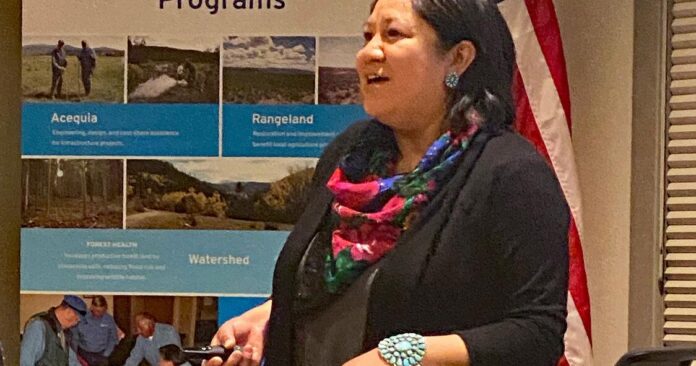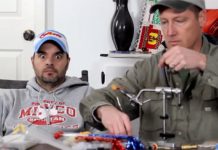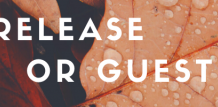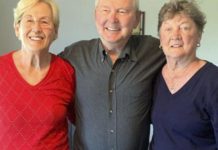How can the sport of fly-fishing, and outdoor recreation in general, attract more diverse groups of people to participate? Erica Nelson, Diné (Navajo) fly-fishing guide and social activist, has a few ideas.
Nelson was the keynote speaker for a gathering of Trout Unlimited members from around New Mexico and the region this past weekend. Nelson spoke about her experiences in outdoor leadership and working with organizations and companies to look at their own policies related to inclusivity in marketing, as well as other aspects, such as hiring and community involvement.
In addition to society-wide changes, like adopting a new paradigm of thinking and a culture change that starts with talking about inclusivity, simple acts such as offering a friendly hello to a newcomer to the river or other outdoor venues can go a long way, Nelson said.
Nelson moved to Lander, Wyo., from Lake Tahoe where she had gone to Sierra Nevada University. She worked for the National Outdoor Leadership School (NOLS).
She used to play disc golf professionally and was looking for a new sport.
“I noticed my co-workers were so active. They would ride their bikes to the Popo Agie River after work to fly-fish. The sport had seemed so grand and remote to me, but they wore their flip-flops and jeans and suggested I check out the free rentals we offered, so I picked up a rod.”
In her first efforts, Nelson found that she was catching more trees than fish. She saw fly-fishing as a puzzle and was determined to figure it out. She watched YouTube videos on how to cast and tie flies. Wondering if anyone else was struggling to learn the sport, she founded Awkward Angler on Instagram to create an online community as a safe place to ask awkward questions about the sport. A podcast by the same name followed.
She has explored unspoken etiquette about the sport and bullying around the type of gear someone uses or what they wear. In her life working in outdoor leadership, whitewater and rock climbing guiding, Nelson has faced racism and sexism and has had to grapple with barriers to entering sports like fly-fishing — including the price of gear, learning appropriate techniques and feeling safe in the outdoors.
“Over the years I decided to embrace the awkwardness when it comes to leadership,” says Nelson. “Part of the name, Awkward Angler, acknowledges that it is awkward to talk about and to hear about social justice issues connected to outdoor recreation. But we have to talk about it if we are sharing land and water. “As an Indigenous woman, venturing out is always a risk. It’s always there,” she adds.
She points out that Indigenous women and girls are murdered at a rate of 10 times more than any others. Having experienced losses herself, she doesn’t always feel safe venturing into the outdoors alone. She acknowledges that others have faced different kinds of barriers and oppression. All oppression is connected, she adds, and says there is not one type of oppression that is more important than another.
Nelson sees some hopeful signs that things are beginning to change.
She founded REAL Consulting in 2018 with business partner Sydney Clark Whittington. Their organization’s name stands for “reconcile, evolve, advance, and lead,” with the goal of guiding organizations toward racial equity and inclusion. In conjunction with Brown Folks Fishing, her company developed the Angling for All pledge to address racism and inequality. The pledge was first signed by Orvis and since by additional organizations such as Patagonia.
“There have been a lot of shifts,” Nelson said. “After the murder of George Floyd in 2020, these issues became part of the national discourse. After that, we started seeing more conversations with organizations and brands. They became more open.”
She says that it’s crucial top leadership staff buys in to allow for an organization-wide change.
“If we all start taking responsibility that will help everyone. That needs to start at the top. If that person knows what equity looks like, we can start to get somewhere,” Nelson added.
Some signs of healthy organizations are people taking responsibility for their attitudes and actions and holding each other accountable, says Nelson. “When co-workers hold each other accountable for mistakes and keep coming back to the table — that’s when we know we will start to see shifts.”
When Nelson began to work in outdoor leadership and guiding, there were not many women of color. “I began working over 10 years ago in the outdoor industry leading hikes, guiding for rock climbing and as a whitewater rafting instructor. In all those experiences, I was usually the only woman or only woman of color. Racism and sexism are extra burdens to carry.”
In October, Nelson was on the cover of the Orvis catalog. In February of this year, she was featured in The New York Times story, “I identify as an angler: Meet Erica Nelson, a female, Indigenous fly-fishing guide.”
Although she was born and raised in northwestern New Mexico, this was Nelson’s first trip to Taos. She currently resides in Crested Butte, ancestrally known as the Ute territory.
“The fly-fishing in Taos was such an amazing experience,” she said. “It also helped the weather and scenery were exceptional. I was surprised to learn about the various species in the Rio Grande at Pilar — including rainbow, brown, cutthroat trout, along with pike and bass. That to me was a very special experience. Taos, in general, was overall a positive and fun experience, however, like most places in the U.S., it has prominent reminders and impacts of colonization. To be honest, as a Diné (Navajo) woman visiting and seeing places named after and dedicated to Kit Carson was a bit alarming and uneasy. Taos is like many other places in that it sits on uncomfortable history, yet with beautifully crafted architecture between Indigenous and Spanish.”
Reflecting on fly-fishing, Nelson says: “I’m a little obsessed with it, looking at interconnectedness of nature and the climate. Everything is interconnected and that can be beautiful and complex. We have to also look at our reliance on oil and gas to get us to the outdoors and understand how all those things are connected.”
As she reflects on the difficult conversations she is having, she says: “Although the work of talking about racism and other oppression can be hard, it can also be joyful. I like to say that true diversity is in the recovery, working through mistakes and coming back to the table so that more authentic communities can be built.”
After Nelson’s talk, she joined a panel discussion.
Marc Space, vice chairman of the New Mexico State Council of Trout Unlimited and VP for Enchanted Circle of Trout Unlimited, said he felt the discussion was productive because panel members were invested in both the subject of diversity and all have a “vested interest in the water quality of Northern New Mexico and how they could be supported by the Enchanted Circle chapter of Trout Unlimited.”
Nelson’s presentation and the panel discussion that followed align with Trout Unlimited’s policy of including a more diverse audience in their activities and conservation practices.
The organization has been around for 60 years. According to its website, it has engaged millions of people in its mission to conserve, protect and restore cold water fisheries. In their Equity Practice, the organization states, “We rely on local participation to inform our science, advocate for trout and salmon and restore rivers and streams. The engagement of diverse, whole communities is critical to ensuring that robust populations of trout and salmon once again thrive in their native range. Our impact has been meaningful, but achieving our mission remains impossible without the unencumbered participation of all people. We can, and will, do better. Identifying and addressing inequities and building space and support for all people to participate in our mission work will make our organization and the communities in which we work stronger, more durable, and more sustaining.”
The past weekend’s get-together was about bringing together TU staff and grassroots work in New Mexico to address what is going well and plans for the future.
Dan Roper, the New Mexico Angler Conservation coordinator, says “I work on policy and advocacy that benefits trout, watershed health, healthy rivers, and funding for restoration projects. Our organization works with our congressional delegation and state legislators to promote things that are good for fish and wildlife and the environment.”
Coming out of the pandemic, there weren’t many events connected to fly-fishing. Now, more is happening, including a reintroduction of Rio Grande cutthroat trout into the Rio Costilla today, Nov. 3 in conjunction with New Mexico Game and Fish and the third graders from TISA and the Trout in the Classroom program. Also coming up are a work project on the Gila River and the Albuquerque International Fly Fishing Film Festival.
Western regional conference
Roper points out that one of the important tasks of last weekend’s retreat was to begin planning for the Western regional meeting that will be held in May 19-21, 2023. For the first time, the gathering will be held in Taos.
Maggie Heumann, manager of volunteer operations with Trout Unlimited National, has been traveling around to different state councils all over the West talking about coming out of COVID.
“A lot of chapters champing at the bit to do activities again,” she said. “I’m here to present about the health of the organization and revitalization strategies looking into next year.”
She is focused on the meeting next May and says that, in addition to the meeting itself, the organization will be taking conservation tours to look at local waterways that need improving as ideas for future projects and also sponsoring a service project, such as a trash pick-up.
She said Trout Unlimited is actively seeking to recruit younger members who care about conservation, recycling, clean water and the climate. “We want to try to harness that energy and get people involved. We are not just a fishing organization but also one that cares about cold water conservation,” she says.
Trout Unlimited is already very active locally. “We have close to two dozen projects in various stages of development across Northern New Mexico. Part of what we pride ourselves on is being part of the local community,” says Garrett Hanks, the TU Northern New Mexico project manager. “People who live in the community do the work; that’s who knows the resources best and are most effective on the ground.”
Projects include large-scale efforts, like watershed-wide work on Comanche Creek that has been going on for 15 years, and smaller-scale projects, like installing barriers in four tributaries of the Rio Hondo to protect native cutthroat populations by preventing other trout species from swimming into the tributaries from the main river.
Credit: Source link































